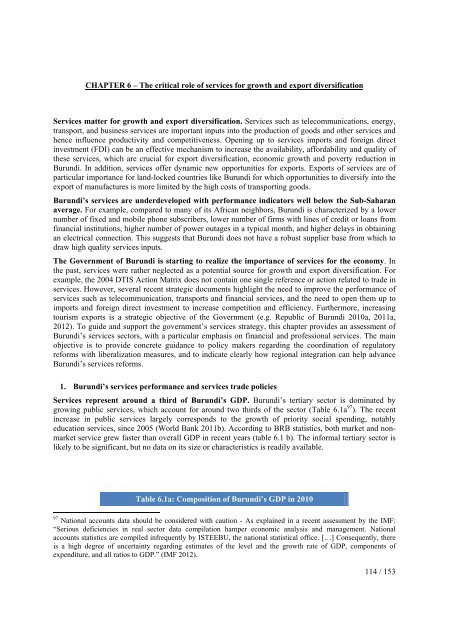(DTIS) Update, Volume 1 â Main report - Enhanced Integrated ...
(DTIS) Update, Volume 1 â Main report - Enhanced Integrated ...
(DTIS) Update, Volume 1 â Main report - Enhanced Integrated ...
Create successful ePaper yourself
Turn your PDF publications into a flip-book with our unique Google optimized e-Paper software.
CHAPTER 6 – The critical role of services for growth and export diversificationServices matter for growth and export diversification. Services such as telecommunications, energy,transport, and business services are important inputs into the production of goods and other services andhence influence productivity and competitiveness. Opening up to services imports and foreign directinvestment (FDI) can be an effective mechanism to increase the availability, affordability and quality ofthese services, which are crucial for export diversification, economic growth and poverty reduction inBurundi. In addition, services offer dynamic new opportunities for exports. Exports of services are ofparticular importance for land-locked countries like Burundi for which opportunities to diversify into theexport of manufactures is more limited by the high costs of transporting goods.Burundi’s services are underdeveloped with performance indicators well below the Sub-Saharanaverage. For example, compared to many of its African neighbors, Burundi is characterized by a lowernumber of fixed and mobile phone subscribers, lower number of firms with lines of credit or loans fromfinancial institutions, higher number of power outages in a typical month, and higher delays in obtainingan electrical connection. This suggests that Burundi does not have a robust supplier base from which todraw high quality services inputs.The Government of Burundi is starting to realize the importance of services for the economy. Inthe past, services were rather neglected as a potential source for growth and export diversification. Forexample, the 2004 <strong>DTIS</strong> Action Matrix does not contain one single reference or action related to trade inservices. However, several recent strategic documents highlight the need to improve the performance ofservices such as telecommunication, transports and financial services, and the need to open them up toimports and foreign direct investment to increase competition and efficiency. Furthermore, increasingtourism exports is a strategic objective of the Government (e.g. Republic of Burundi 2010a, 2011a,2012). To guide and support the government’s services strategy, this chapter provides an assessment ofBurundi’s services sectors, with a particular emphasis on financial and professional services. The mainobjective is to provide concrete guidance to policy makers regarding the coordination of regulatoryreforms with liberalization measures, and to indicate clearly how regional integration can help advanceBurundi’s services reforms.1. Burundi’s services performance and services trade policiesServices represent around a third of Burundi’s GDP. Burundi’s tertiary sector is dominated bygrowing public services, which account for around two thirds of the sector (Table 6.1a 97 ). The recentincrease in public services largely corresponds to the growth of priority social spending, notablyeducation services, since 2005 (World Bank 2011b). According to BRB statistics, both market and nonmarketservice grew faster than overall GDP in recent years (table 6.1 b). The informal tertiary sector islikely to be significant, but no data on its size or characteristics is readily available.Table 6.1a: Composition of Burundi’s GDP in 201097 National accounts data should be considered with caution - As explained in a recent assessment by the IMF:“Serious deficiencies in real sector data compilation hamper economic analysis and management. Nationalaccounts statistics are compiled infrequently by ISTEEBU, the national statistical office. […] Consequently, thereis a high degree of uncertainty regarding estimates of the level and the growth rate of GDP, components ofexpenditure, and all ratios to GDP.” (IMF 2012).114 / 153
















